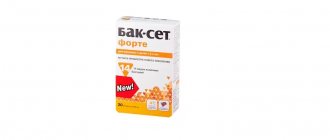Compound
| Powder for oral administration | 1 sachet |
| Ingredients: | |
| lyophilisate of probiotic bacteria* | 1×109CFU |
| fructooligosaccharides (prebiotic component) | 1.43 g |
| auxiliary ingredients: corn starch | |
| *Lactobacillus acidophilus LA-14 - 1.11×108 CFU; Lactobacillus casei CBT (1) - 1.11×108 CFU; Bifidobacterium lactis BL-04 - 1.11×108 CFU; Lactobacillus paracasei Lpc-37 - 1.11×108 CFU; Lactobacillus plantarum Lp-115 — 1.11×108 CFU; Lactobacillus rhamnosus GG - 1.11×108 CFU; Lactobacillus salivarius Ls-33 - 1.11×108 CFU; Bifidobacterium bifidum BF-2 - 1.11×108 CFU; Bifidobacterium longum BG-7 - 1.11×108 CFU |
Effect on the body
The intestine is the body's largest defense system, and its microflora performs many functions: protects the intestines from colonization by bacteria unusual for it, stimulates the immune system, prevents the development of allergies (including atopic dermatitis) and inflammatory processes in the intestines, enhances the production of interferons, synthesizes vitamins groups A, B, K, folic acid, reduces intoxication of the body as a whole. The following factors contribute to disruption of intestinal microflora: caesarean section during childbirth; artificial feeding (use of formula milk); taking certain medications; diarrhea (diarrhea).
It has been proven that some groups of drugs have a direct effect on the microflora of the gastrointestinal tract: antibiotics successfully fight pathogenic microorganisms, but at the same time kill beneficial bacteria. Every 3rd case of taking antibiotics causes diarrhea; NSAIDs (including drugs containing paracetamol) can cause damage to the mucous membrane of the stomach and intestines, leading to inflammation, the formation of ulcers and erosions; antifungal agents may have side effects such as decreased appetite, nausea, constipation or diarrhea, flatulence, and abdominal pain.
An attack of diarrhea is accompanied by partial leaching of microflora from the child’s intestines.
Symptoms of intestinal microflora disorders include diarrhea (diarrhea), dyspepsia (indigestion), constipation, flatulence (bloating), nausea, belching, vomiting, discomfort and abdominal pain.
One of the ways to form and restore microflora is to eat pro- and prebiotics.
Probiotics are live microorganisms, representatives of normal human flora, correcting intestinal microflora (lacto- and bifidobacteria).
Prebiotics are food ingredients, mainly oligosaccharides. When released into the large intestine, they promote the growth and development of normal intestinal microflora.
Synbiotics are ingredients that are a combination of pro- and prebiotics. They have a mutually reinforcing effect on metabolic processes in the human body.
Synbiotic Maxilak® Baby helps restore and normalize the intestinal microflora in children (from 4 months), especially in situations involving the use of drugs that upset the balance of the child’s gastrointestinal microflora. Maxilak® Baby is the first and only synbiotic that contains 9 cultures of beneficial bacteria in the concentration required for the child’s intestines - 1 billion (1×109) CFU.
Maxilak Baby powder for preparing solution No. 10
A country
Italy
The country of production may vary depending on the batch of goods. Please check with the operator for detailed information when confirming your order.
Compound
1 sachet contains: Active ingredients: lyophilisate of probiotic bacteria* 1×109 CFU; * Lactobacillus acidophilus LA-14 - 1.11×108 CFU; Lactobacillus casei CBT (1) - 1.11×108 CFU; Bifidobacterium lactis BL-04 - 1.11×108 CFU; Lactobacillus paracasei Lpc-37 - 1.11×108 CFU; Lactobacillus plantarum Lp-115 - 1.11×108 CFU; Lactobacillus rhamnosus GG - 1.11×108 CFU; Lactobacillus salivarius Ls-33 - 1.11×108 CFU; Bifidobacterium bifidum BF-2 - 1.11×108 CFU; Bifidobacterium longum BG-7 - 1.11×108 CFU; fructooligosaccharides (prebiotic component) 1.43 g. Prebiotic component: oligofructose 1.43 mg. Excipients: maltodextrin (filler) - 0.85 g, silicon dioxide (baking powder) - 0.1 g. 1.5 g - sachet (10) - cardboard boxes.
Pharmacological properties
A dietary supplement to food, it is not a medicine. Synbiotic (probiotic + prebiotic) The development and strengthening of a child’s immunity is associated with the formation of his intestinal microflora. Microorganisms inhabit human organs and systems starting from birth. A child, passing through the mother’s birth canal, receives protective beneficial bacteria from her, and this microbial colonization is one of the most important stages in the formation of normal gastrointestinal microflora. Babies born by Caesarean section are thought to be more susceptible to infections, develop later colonization of the gut with beneficial bacteria, and are more likely to be susceptible to other diseases. An equally important stage in the formation of microflora is the period of breastfeeding. During this period of life, the child receives mother's milk, which ensures the formation of normal intestinal microflora. Mother's milk contains lactose, lysozyme, immunoglobulins, as well as bifidogenic components that promote the growth of bifidobacteria. All these are irreplaceable components necessary for every baby to form normal intestinal microflora. Already after the first year of life, the composition of a child’s intestinal microflora in terms of quantitative and qualitative composition approaches those of adults. Why is it so important to take care of the balance of intestinal microflora from the first days of a child’s life? The intestine is the body's largest defense system, and its microflora performs many functions: protects the intestines from the colonization of bacteria unusual for it, stimulates the immune system, prevents the development of allergies (including atopic dermatitis) and inflammatory processes in the intestines, enhances the production of interferons, synthesizes vitamins groups B, A, K, folic acid, reduces intoxication of the body as a whole. What factors can contribute to disruption of intestinal microflora? — Caesarean section during childbirth — Artificial feeding (infant formula) — Taking certain medications — Diarrhea It has been proven that some groups of drugs have a direct effect on the microflora of the gastrointestinal tract: — antibiotics — successfully fight pathogenic microorganisms, but at the same time kill beneficial ones bacteria. Every 3rd case of taking antibiotics causes diarrhea; - non-steroidal anti-inflammatory drugs (including drugs containing paracetamol) - can cause damage to the mucous membrane of the stomach and intestines, leading to inflammation, the formation of ulcers and erosions; - antifungal agents - may have side effects such as loss of appetite, nausea, constipation or diarrhea, flatulence, abdominal pain. An attack of diarrhea is accompanied by partial leaching of microflora from the child’s intestines. What are the symptoms of intestinal microflora disorders? Symptoms of intestinal microflora disorders are: diarrhea (diarrhea), dyspepsia (indigestion), constipation, flatulence (bloating), nausea, belching, vomiting, discomfort and pain in the abdomen, etc. One of the ways to form and restore microflora is to eat about - and prebiotics. Probiotics are live microorganisms, representatives of normal human flora, correcting intestinal microflora (lacto- and bifidobacteria). Prebiotics are food ingredients, mainly oligosaccharides. When released into the large intestine, they promote the growth and development of normal intestinal microflora. Synbiotics are ingredients that are a combination of pro- and prebiotics. They have a mutually reinforcing effect on metabolic processes in the human body. Maxilac® Baby is the first and only synbiotic that contains 9 (nine) cultures of beneficial bacteria in the concentration required for the child’s intestines - 1 billion (1×109) CFU. Synbiotic Maxilac® Baby helps restore and normalize the intestinal microflora in children (from 4 months), especially in situations involving the use of medications that disrupt the balance of the child’s gastrointestinal microflora. Lactobacilli contained in the synbiotic Maxilac® Baby suppress the growth of pathogenic microflora, provide the body's protective function and naturally strengthen the immune system. Bifidobacteria, which are also part of the synbiotic Maxilak® Baby, participate in the synthesis of amino acids, proteins and vitamins, enhance the absorption of calcium, iron, and vitamin D ions. Fructooligosaccharides (a prebiotic in Maxilak® Baby) stimulate the rapid reproduction of beneficial bacteria and inhibit the development of pathogenic ones. reduce intestinal contamination with toxins and improve its functioning, stimulate peristalsis, cleanse toxins, serve to prevent constipation and diarrhea, and help normalize gastrointestinal tract functions. Maxilak® Baby is a synbiotic specially created for children and produced in the form of a lyophilisate, the granules of which are protected by Micro MURE® (Multi Resistant Encapsulation) technology. This technology protects Maxilak® Baby granules from the action of internal and external environmental factors, due to which most of the probiotic bacteria in the composition of Maxilak® Baby enter the intestines and do not dissolve in the stomach, which has a positive effect on the restoration of the gastrointestinal microflora, because the concentration of colonies of microorganisms increases from the stomach to the colon. Maxilak® Baby does not contain casein or preservatives, so it is safe for children with allergies to products of this group. Maxilak® Baby can be used by children with lactose intolerance.
Indications for use
Maxilak® Baby, taking into account its properties, is especially recommended for maintaining normal intestinal microflora in children: - with functional intestinal disorders: diarrhea, dyspepsia, constipation, flatulence, nausea, belching, vomiting/discomfort and abdominal pain, etc.; - as an adjuvant during and/or after taking medications that may cause changes in the qualitative or quantitative composition of the gastrointestinal microflora; — during seasonal surges of infectious diseases.
Mode of application
Children aged 4 months to 2 years: 1 sachet per day with meals. It is recommended to dissolve the contents of the sachet in warm water or milk. Children over 2 years old and adults: 2 sachets per day with meals. It is recommended to dissolve the contents of the sachet in warm water or milk. The duration of treatment is at least 10 days. If necessary, taking Maxilac® Baby can be extended up to 1 month.
Contraindications
- individual intolerance to components.
Use in children
Use in children over 4 months of age.
Component Properties
Lactobacilli contained in Maxilak® Baby suppress the growth of pathogenic microflora, provide the body's protective function and naturally strengthen the immune system.
Bifidobacteria, which are also part of Maxilak® Baby, are involved in the synthesis of amino acids, proteins and vitamins, and enhance the absorption of calcium ions, iron, and vitamin D.
Fructooligosaccharides (a prebiotic in Maxilak® Baby) stimulate the rapid proliferation of beneficial bacteria and inhibit the development of pathogenic ones, reduce intestinal contamination with toxins and improve its functioning, stimulate peristalsis, cleanse toxins, serve to prevent constipation and diarrhea, and help normalize gastrointestinal functions.
Maxilak® Baby is a synbiotic specially created for children and is available in the form of a lyophilisate, the granules of which are protected by Micro MURE® (Multi Resistant Encapsulation) technology. This technology protects Maxilak® Baby granules from the action of internal and external environmental factors, due to which most of the probiotic bacteria in Maxilak® Baby enter the intestines and do not dissolve in the stomach, which has a positive effect on the restoration of the gastrointestinal microflora, because the concentration of colonies of microorganisms increases from the stomach to the colon.
Maxilak® Baby does not contain casein or preservatives, so it is safe for children with allergies to products of this group.
Maxilak® Baby can be used by children with lactose intolerance.
Characteristic
Dietary supplement Maxilak® is a freeze-dried strain of probiotic bacteria, so the color of the substance in the capsule can be light or dark cream. It is acceptable to have darker, brown or black color shades of the capsule contents. This coloring occurs as a result of the encapsulation process and is not a deviation from the norm.
Special protection SFERA (SURROUNDED FREEZE RELEASE ARMOR)
promotes the preservation of beneficial bacteria in the Maxilac® dietary supplement. The bacteria present in Maxilac® are protected from the acidic contents of gastric juice, bile salts and digestive enzymes. Most of the probiotic bacteria enter the intestines and are not destroyed in the stomach, which has a positive effect on the restoration of the microflora of the gastrointestinal tract (GIT).
Recommended
As a means of helping to maintain normal intestinal microflora in children with the following diseases and conditions:
- functional intestinal disorders (diarrhea (diarrhea), dyspepsia (indigestion), constipation, flatulence (bloating), nausea, belching, vomiting);
- taking medications that can cause changes in the qualitative or quantitative composition of the gastrointestinal microflora (as an adjuvant);
— during seasonal surges of infectious diseases.
Directions for use and doses
Inside, during meals. It is recommended to dissolve the contents of the sachet in warm water or milk.
Children aged 4 months to 2 years - 1 sachet per day; from 2 years and adults - 2 sachets per day.
The duration of treatment is at least 10 days. If necessary, taking Maxilak® Baby can be extended up to 1 month.
To normalize the intestinal microflora in adults and children from 3 years of age, Maxilac® (caps.) should be taken. Use 1 capsule/day. The course is at least 10 days.
It is recommended to consult a doctor before use.
Manufacturer
Manufacturer: DANISCO France SAS ZA de Buxieres BP 10, 86220, DANGE-SAINT-ROMAIN, France.
Importer: ZAO Danisko, 121614, Russian Federation, Moscow, st. Krylatskaya, 17, bldg. 3.
Organization authorized to accept claims from consumers: JSC FP Obolenskoye, 142279, Russian Federation, Moscow region, Serpukhovsky district, urban settlement. Obolensk, r.p. Obolensk, district of the settlement Obolensk, industrial zone, p. 78.
Tel/fax
www.maxilac.ru



